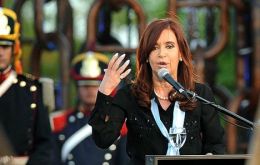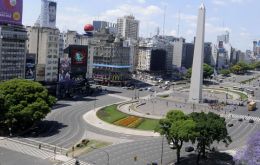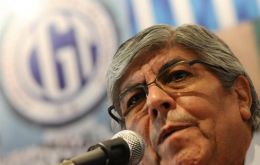MercoPress. South Atlantic News Agency
Tag: Cristina Fernandez
-
Thursday, November 29th 2012 - 06:42 UTC
Argentina increases 44% wellhead natural gas prices to attract investment

Argentine president Cristina Fernandez announced on Wednesday that wellhead natural gas prices are to rise substantially from current levels, an estimated 44%, with the purpose of attracting more investments and increasing production.
-
Wednesday, November 28th 2012 - 16:03 UTC
Brazil contrary to lifting suspension of Paraguay from Unasur until April

Brazilian Executive special advisor on International Affairs, Marco Aurelio Garcia anticipated that at the coming summit in Lima, the Union of South American Nations, Unasur, would not lift the suspension on Paraguay which will hold until April’s election.
-
Tuesday, November 27th 2012 - 22:54 UTC
Argentina will make a plea at the Unasur summit to jointly face ‘vulture funds’

During a ceremony to receive visiting Peruvian leader Ollanta Humala Argentine President Cristina Fernández said that she would make a plea for Unasur members to come together in the fight against ‘vulture funds’ (hedge funds) when the region’s leaders meet this week in Lima.
-
Monday, November 26th 2012 - 19:35 UTC
The Chicago Tribune on the bonds dispute: ‘Cry for yourself, Argentina’

The Chicago Tribune, one of the leading Midwest US newspapers has been following closely the dispute in New York courts between the Argentine government and investment funds that are demanding full payment of sovereign bonds.
-
Monday, November 26th 2012 - 07:30 UTC
Crucial week for Argentina’s bonds’ dispute with ‘technical default’ fears looming

The Argentine government will appeal on Monday the New York federal court ruling from Thomas Griesa which orders the country to pay 1.3billion dollars to the investment funds which held out from the (2005 and 2010) restructuring of the 2002 defaulted sovereign debt.
-
Wednesday, November 21st 2012 - 20:01 UTC
Ghana rejects Argentine plea to drop case of impounded frigate ARA Libertad

Ghana rejected on Wednesday Argentina’s plea for Accra City’s Commercial Tribunal to drop the case that kept the ARA Libertad navy training frigate impounded at Tema port since October 2nd.
-
Wednesday, November 21st 2012 - 07:53 UTC
Cristina Fernandez: “no one is going to pressure me especially with bullying or thugs”

After the first national strike against her administration, Argentine President Cristina Fernández blasted the CGT and CTA-led protest claiming they appealed to “bullying” tactics and called on workers to defend the “economic development and inclusion model”.
-
Wednesday, November 21st 2012 - 07:48 UTC
Day of protest a “complete success” and “much stronger than we expected”

Argentine labour unions leaders said that support for the successful national strike was “much stronger than we expected” and urged President Cristina Fernández to listen to “people’s message.”
-
Wednesday, November 21st 2012 - 07:41 UTC
General strike, supported by pickets paralyzed Argentina

Two main opposition umbrella trade unions and other organizations protesting Argentina's economic policies paralyzed the country on Tuesday in the first general strike since President Cristina Fernandez took office five years ago.
-
Tuesday, November 20th 2012 - 06:33 UTC
Major national strike in Argentina with pickets to implement the measure

Argentina’s three main organized labour groupings, and in opposition to Argentine president Cristina Fernandez, have called for a national strike on Tuesday which counts with the support of several tens of camp and city organizations plus hundreds of pickets in the main cities ‘to ensure there is no activity’.
